With ‘Mountain Mamas,’ Tiny_Theatre delves into deep dark of three female Appalachian miners
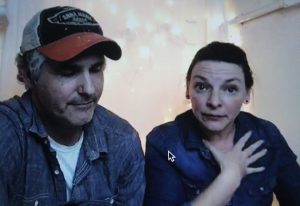 Last night, Rachel Burttram and Brendan Powers were giddy with anticipation as they shared three scenes with their Tiny_Theatre virtual audience from Atlanta playwright Daryl Lisa Fazio’s new play, Mountain Mamas. Their unbridled delight wasn’t just because they like and admire the “extraordinary playwright we are so proud to call a friend.” Like parents on Christmas morning who know they’ve found
Last night, Rachel Burttram and Brendan Powers were giddy with anticipation as they shared three scenes with their Tiny_Theatre virtual audience from Atlanta playwright Daryl Lisa Fazio’s new play, Mountain Mamas. Their unbridled delight wasn’t just because they like and admire the “extraordinary playwright we are so proud to call a friend.” Like parents on Christmas morning who know they’ve found 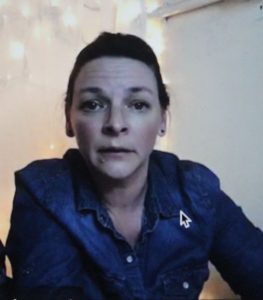 the perfect presents for their brood, Rachel and Brendan could hardly wait to share their latest gem of a find.
the perfect presents for their brood, Rachel and Brendan could hardly wait to share their latest gem of a find.
The mountain mamas at the center of Fazio’s play are three generations of female Appalachian coal miners. The matriarch is Wanda Armstrong, one of the first women to venture underground some 40 years ago. A union organizer, she has always been one of the most respected miners of any gender, deeply maternal and nurturing with boundless positivity, humor and an endless well of physical energy and readiness to fight every battle that comes 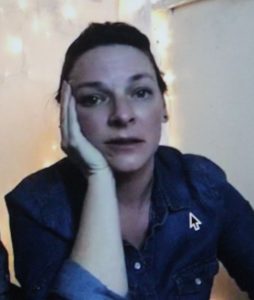 her way.
her way.
Her daughter, Patsy, followed mama into the deep some 20 years ago. But now she sits in a wheelchair, locked insider her body, the victim of a head injury not quite severe enough to explain her catatonic state.
The youngest Armstrong is 18-year-old Livvy, a high school senior who has the intelligence and grades for college and big things, but is bound and determined to carry on the mining tradition established by her mama and grandma.
As usual, Burttram and Powers were circumspect with the scenes and excerpts they decided to share. 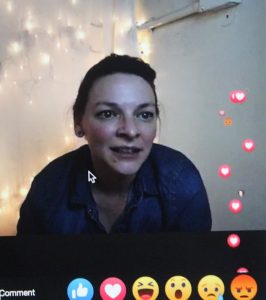 So it’s impossible to decipher Mountain Mama’s overarching themes – although it’s apparent from the reading that two of the biggest mysteries to be solved during the course of the play are (1) what triggered the PTSD-fueled anger and shame that underlies Patsy’s physical/mental state and (2) why would a young woman with big aspirations and an awareness of the troubled world around her want to take up coal mining given the tenuous state of the industry and the jeopardy faced by those who extract coal some two miles under their mountain.
So it’s impossible to decipher Mountain Mama’s overarching themes – although it’s apparent from the reading that two of the biggest mysteries to be solved during the course of the play are (1) what triggered the PTSD-fueled anger and shame that underlies Patsy’s physical/mental state and (2) why would a young woman with big aspirations and an awareness of the troubled world around her want to take up coal mining given the tenuous state of the industry and the jeopardy faced by those who extract coal some two miles under their mountain.
As 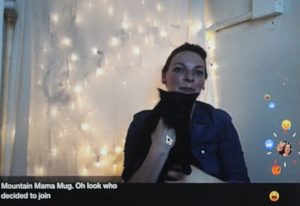 veteran actors, Burttram and Powers were drawn to this play by the “soulful, non-technical theatrical devices” that Fazio has incorporated into her new play. The chief among these is that while Patsy cannot speak or move, the audience is privy to her inner dialogue. But audiences may be more enamored of the fact that the heroines of Fazio’s play are three women who not only function in a world most of us can’t imagine,
veteran actors, Burttram and Powers were drawn to this play by the “soulful, non-technical theatrical devices” that Fazio has incorporated into her new play. The chief among these is that while Patsy cannot speak or move, the audience is privy to her inner dialogue. But audiences may be more enamored of the fact that the heroines of Fazio’s play are three women who not only function in a world most of us can’t imagine, 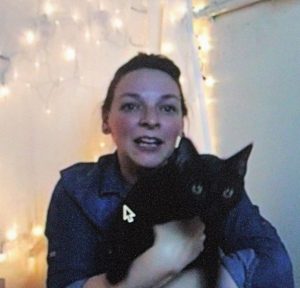 but embrace life in a world traditionally populated exclusively by men. It’s part of her commitment is to writing multi-dimensional roles for women of all ages, races, and classes – which is clearly in evidence in what little we heard last night from Mountain Mamas.
but embrace life in a world traditionally populated exclusively by men. It’s part of her commitment is to writing multi-dimensional roles for women of all ages, races, and classes – which is clearly in evidence in what little we heard last night from Mountain Mamas.
In the former regard, mining is without question the most perilous job on or under the earth. Beyond methane fires and carbon dioxide gas, rockbursts and airblasts periodically send rock the size of campers hurtling 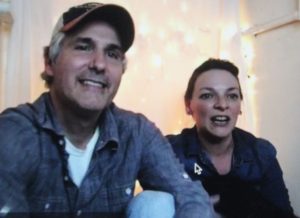 through drifts, raises and grimy stopes, reducing hapless miners to puddles of biological splat in a nanosecond. In the battle waged by jackleg miners in the fractured and folded metamorphic world deep underground, miners inevitably lose. Injuries are an unavoidable cost of doing business. Broken ribs, crushed limbs and cracked skulls are badges of honor, and every miner knows that there’s
through drifts, raises and grimy stopes, reducing hapless miners to puddles of biological splat in a nanosecond. In the battle waged by jackleg miners in the fractured and folded metamorphic world deep underground, miners inevitably lose. Injuries are an unavoidable cost of doing business. Broken ribs, crushed limbs and cracked skulls are badges of honor, and every miner knows that there’s  no guarantee they’ll ever see daylight again. When the rock stops talking, look out!
no guarantee they’ll ever see daylight again. When the rock stops talking, look out!
Because risk and danger are essential to the job’s mystique, mining has traditionally been the exclusive province of men – testosterone-adrenaline junkies who embrace trouble just for the rush.  Think miner, and most conjure images of fearless winnowy men who work hard, play hard and fuck hard, members of a lifelong fraternity who’d grown up together and whose grandfathers, dads and uncles all worked underground at one time or another.
Think miner, and most conjure images of fearless winnowy men who work hard, play hard and fuck hard, members of a lifelong fraternity who’d grown up together and whose grandfathers, dads and uncles all worked underground at one time or another.
And like locker rooms and board rooms, women were long unwelcome in the subterranean rooms and chambers of their underworld. It wasn’t just that women were regarded as too frail for the work. Myths abounded that they brought bad luck. 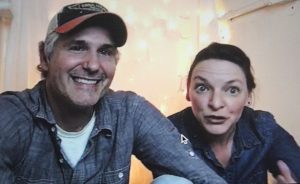 Some states (including Colorado and Wyoming) actually enacted laws prohibiting women from working underground.
Some states (including Colorado and Wyoming) actually enacted laws prohibiting women from working underground.
But the percentage of women working underground has been inching up, from 6 percent in the late ‘90s to nearly 13 percent today. And the vast majority 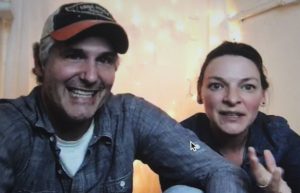 of female miners would, according to surveys, actively encourage more women to take up a career in the industry – even though as an industry, mining ranks dead last globally when it comes to women in leadership roles.
of female miners would, according to surveys, actively encourage more women to take up a career in the industry – even though as an industry, mining ranks dead last globally when it comes to women in leadership roles.
But even though female miners like Wanda and Patsy might encourage other women to pursue a career underground, would 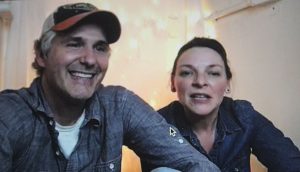 they want their bright young Livvy to follow them into a dying industry that not only poses the daily risk of grievous injury and death, but debilitating later-in-life medical conditions ranging from lung problems to hypertension, diabetes and chronic digestive maladies? Can the lure of tradition and the veneration of heritage
they want their bright young Livvy to follow them into a dying industry that not only poses the daily risk of grievous injury and death, but debilitating later-in-life medical conditions ranging from lung problems to hypertension, diabetes and chronic digestive maladies? Can the lure of tradition and the veneration of heritage 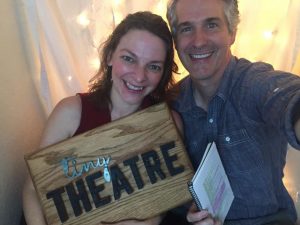 really be that strong?
really be that strong?
This, then, is the backdrop for Daryl Lisa Fazio’s Mountain Mamas, no matter what else her play may entail. And although last night’s reading depicted two casually-attired actors sitting in a claustrophobic closet decorated by a sheet and some Christmas lights, the play challenges set designers with the equally-giddy possibilities for bringing the dank, dark, dramatic  world below into the light of the stage.
world below into the light of the stage.
Other highlights from last evening included:
- a voiceover by Patrick Erhardt;
- a male character by the name of “Paww Paww” played by Bren who revels in classic Hollywood musicals like Singing in the Rain and Top Hat (which everyone knows is better than Swing Time, The Gay Divorcee or Flying Down to Rio);
- celebrating Bren’s birthday; and
- a well-deserved toast to police officers everywhere as they man and woman the frontlines in the COVID-19 pandemic.
 Kudos to Rachel and Bren for bringing another titillating tome to the virtual forefront.
Kudos to Rachel and Bren for bringing another titillating tome to the virtual forefront.
And kudos to Fazio for delving into a world few other playwrights would the temerity to attempt.
Fazio describes herself not only as a playwright and actor (with a B.A. in Theatre from Northwestern), but an “over-educated” freelance graphic designer (MFA, Graphic Design, University of Memphis). Her plays and musicals (the latter written with composer, Aaron McAllister) have been produced  Off-Broadway (American Theatre of Actors, Theatre Row, New York Musical Theatre Festival) and in professional regional and international theatres including Theatrical Outfit, Penobscot Theatre, Actor’s Express, Aurora Theatre and Actors Rep of Luxembourg. She has been commissioned by Horizon Theatre and Emory University. Plays have also been developed by the Alliance Theatre, Synchronicity Theatre, and Working Title Playwrights. She is an O’Neill Finalist,
Off-Broadway (American Theatre of Actors, Theatre Row, New York Musical Theatre Festival) and in professional regional and international theatres including Theatrical Outfit, Penobscot Theatre, Actor’s Express, Aurora Theatre and Actors Rep of Luxembourg. She has been commissioned by Horizon Theatre and Emory University. Plays have also been developed by the Alliance Theatre, Synchronicity Theatre, and Working Title Playwrights. She is an O’Neill Finalist,  an Alliance Reiser Artist’s Lab recipient, and has had a musical selected for the National Alliance of Musical Theatre Festival. She is a professional member of the Dramatist Guild.
an Alliance Reiser Artist’s Lab recipient, and has had a musical selected for the National Alliance of Musical Theatre Festival. She is a professional member of the Dramatist Guild.
At Florida Rep, Daryl has had work produced as part of Rep’s PlayLab. In fact, Rachel has been in multiple readings of Daryl’s work, including Safety Net and Split in Three (for which Rachel originated the role of Nell).
Tune in to 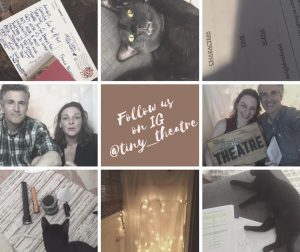 Tiny_Theatre next Monday at 9:00 to see who and what Burttram and Powers have mined from their submission bin for your listening entertainment.
Tiny_Theatre next Monday at 9:00 to see who and what Burttram and Powers have mined from their submission bin for your listening entertainment.
April 18, 2020.
RELATED POSTS.
- Tiny Theatre proving actors, text and an audience are all you need for theater
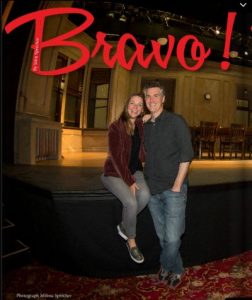 Burttram and Powers’ Tiny Theatre giving voice to playwrights near and far
Burttram and Powers’ Tiny Theatre giving voice to playwrights near and far- Scenes from ‘St. Francis’ performed by Tiny Theatre on April 15
- Scenes from Simon Fill’s ‘Burning Cities’ charming and endearing
- Spotlight on actor Rachel Burttram
- Spotlight on actor Brendan Powers














 Tom Hall is both an amateur artist and aspiring novelist who writes art quest thrillers. He is in the final stages of completing his debut novel titled "Art Detective," a story that fictionalizes the discovery of the fabled billion-dollar Impressionist collection of Parisian art dealer Josse Bernheim-Jeune, thought by many to have perished during World War II when the collection's hiding place, Castle de Rastignac in southern France, was destroyed by the Wehrmacht in reprisal for attacks made by members of the Resistance operating in the area. A former tax attorney, Tom holds a bachelor's degree as well as both a juris doctorate and masters of laws in taxation from the University of Florida. Tom lives in Estero, Florida with his fiancee, Connie, and their four cats.
Tom Hall is both an amateur artist and aspiring novelist who writes art quest thrillers. He is in the final stages of completing his debut novel titled "Art Detective," a story that fictionalizes the discovery of the fabled billion-dollar Impressionist collection of Parisian art dealer Josse Bernheim-Jeune, thought by many to have perished during World War II when the collection's hiding place, Castle de Rastignac in southern France, was destroyed by the Wehrmacht in reprisal for attacks made by members of the Resistance operating in the area. A former tax attorney, Tom holds a bachelor's degree as well as both a juris doctorate and masters of laws in taxation from the University of Florida. Tom lives in Estero, Florida with his fiancee, Connie, and their four cats.